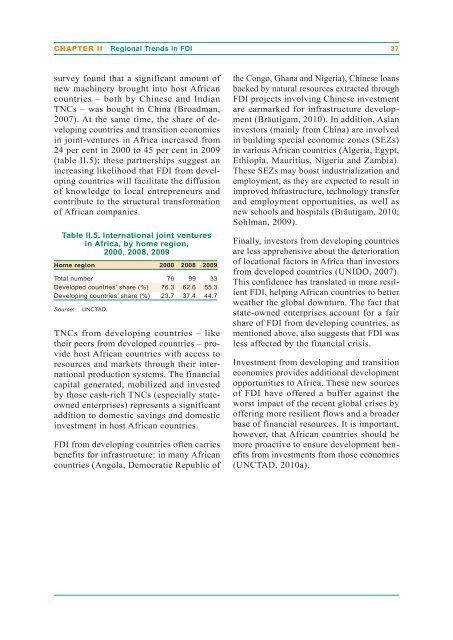UN World Investment Report 2010 - Office of Trade Negotiations
UN World Investment Report 2010 - Office of Trade Negotiations
UN World Investment Report 2010 - Office of Trade Negotiations
Create successful ePaper yourself
Turn your PDF publications into a flip-book with our unique Google optimized e-Paper software.
CHAPTER II Regional Trends in FDI 37<br />
survey found that a significant amount <strong>of</strong><br />
new machinery brought into host African<br />
countries – both by Chinese and Indian<br />
TNCs – was bought in China (Broadman,<br />
2007). At the same time, the share <strong>of</strong> developing<br />
countries and transition economies<br />
in joint-ventures in Africa increased from<br />
24 per cent in 2000 to 45 per cent in 2009<br />
(table II.5); these partnerships suggest an<br />
increasing likelihood that FDI from developing<br />
countries will facilitate the diffusion<br />
<strong>of</strong> knowledge to local entrepreneurs and<br />
contribute to the structural transformation<br />
<strong>of</strong> African companies.<br />
Table II.5. International joint ventures<br />
in Africa, by home region,<br />
2000, 2008, 2009<br />
Home region 2000 2008 2009<br />
Total number 76 99 33<br />
Developed countries’ share (%) 76.3 62.6 55.3<br />
Developing countries’ share (%) 23.7 37.4 44.7<br />
Source: <strong>UN</strong>CTAD.<br />
TNCs from developing countries – like<br />
their peers from developed countries – provide<br />
host African countries with access to<br />
resources and markets through their international<br />
production systems. The financial<br />
capital generated, mobilized and invested<br />
by those cash-rich TNCs (especially stateowned<br />
enterprises) represents a significant<br />
addition to domestic savings and domestic<br />
investment in host African countries.<br />
FDI from developing countries <strong>of</strong>ten carries<br />
benefits for infrastructure: in many African<br />
countries (Angola, Democratic Republic <strong>of</strong><br />
the Congo, Ghana and Nigeria), Chinese loans<br />
backed by natural resources extracted through<br />
FDI projects involving Chinese investment<br />
are earmarked for infrastructure development<br />
(Bräutigam, <strong>2010</strong>). In addition, Asian<br />
investors (mainly from China) are involved<br />
in building special economic zones (SEZs)<br />
in various African countries (Algeria, Egypt,<br />
Ethiopia, Mauritius, Nigeria and Zambia).<br />
These SEZs may boost industrialization and<br />
employment, as they are expected to result in<br />
improved infrastructure, technology transfer<br />
and employment opportunities, as well as<br />
new schools and hospitals (Bräutigam, <strong>2010</strong>;<br />
Sohlman, 2009).<br />
Finally, investors from developing countries<br />
are less apprehensive about the deterioration<br />
<strong>of</strong> locational factors in Africa than investors<br />
from developed countries (<strong>UN</strong>IDO, 2007).<br />
This confidence has translated in more resilient<br />
FDI, helping African countries to better<br />
weather the global downturn. The fact that<br />
state-owned enterprises account for a fair<br />
share <strong>of</strong> FDI from developing countries, as<br />
mentioned above, also suggests that FDI was<br />
less affected by the financial crisis.<br />
<strong>Investment</strong> from developing and transition<br />
economies provides additional development<br />
opportunities to Africa. These new sources<br />
<strong>of</strong> FDI have <strong>of</strong>fered a buffer against the<br />
worst impact <strong>of</strong> the recent global crises by<br />
<strong>of</strong>fering more resilient flows and a broader<br />
base <strong>of</strong> financial resources. It is important,<br />
however, that African countries should be<br />
more proactive to ensure development benefits<br />
from investments from those economies<br />
(<strong>UN</strong>CTAD, <strong>2010</strong>a).

















